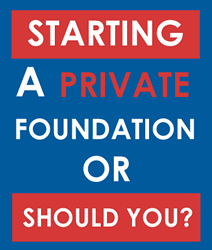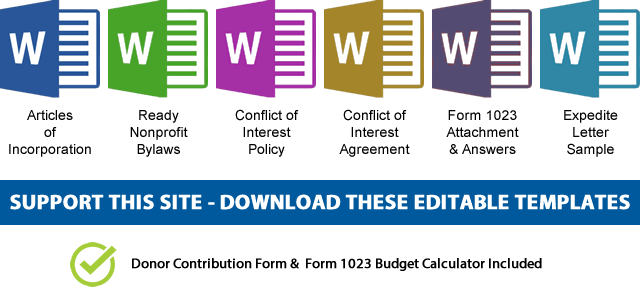Everything you need to know about starting a Private Foundation
 A nonprofit private foundation is a form of tax-exempt nonprofit organization recognized by the IRS under section 501(c)(3) of the Internal Revenue Code.
A nonprofit private foundation is a form of tax-exempt nonprofit organization recognized by the IRS under section 501(c)(3) of the Internal Revenue Code.
Starting a private foundation is NOT like starting a public charity, a private foundation is basically a family run business, it is extremely autocratic in nature, and more often than not is set up for tax evasion by the head of a wealthy family.
Unlike public charities, private foundations are often started by people of means, and benefiting the public or being charitable is not their first mission – it’s rather a secondary burden imposed upon them by the IRS.
Before you shoot me, let me make it clear: not all private foundations are setup by thieves, (although many are) there are many responsible and well meaning private foundations that do many good, but the reality stays the same.
Private foundations have advantages & benefits such as:
Unlike a public charity organizations which are owned by the people, private foundations have owners – not donors – because the donors are the owners in the first place. Sounds complicated? Maybe it does if you’re an honest person – but to majority of those who opt for a private foundation it’s business as usual.
Private foundations can, and do:
- reduce the taxable income of their owners
- they avoid capital gain tax on properties of their owners,
- and potentially can eliminate estate taxes.
Not only that, private foundations can award scholarships and SELECT the recipient. They can also invest their funds, have business holdings, hire friends and family, pay expenses, and compensate their own family members.
If that wasn’t enough, they can – and do – hoard 95% of their funds and spend only 5% of their investment income on the so-called “good deeds” they claimed in their application.
Public charities cannot do any of these.
Private foundations have a few disadvantageous such as:
A private (non-operating) foundation is more strictly regulated by the IRS, and is subject to a number of anti-abuse rules and excise taxes that don’t apply to public charities, because the IRS knows that they are not very charitable.
For example, private foundations are subject to tax on their net investment income and other excise taxes. The Internal Revenue Code imposes other requirements on private foundations as well, including strict restrictions on self-dealing, annual income distribution requirements, limits on holdings in business, and restrictions on certain investments.
- The only consolation, if any, is that private foundation violations do result in IRS slapping them with heavy taxes – not only on the foundation itself – but also on foundation directors and certain related parties.
The biggest disadvantage is that there’s a cap on the amount of a contribution that a donor can deduct as a charitable deduction. For donations to a public charity, that limit is 50% of the donor’s adjusted gross income. For contributions to a private foundation, the limit is 30%. In addition, contributors can deduct a higher percentage for contributions of capital gain property to public charities.
This makes private foundations almost ineligible for grants and big contributions as most big donors are looking for tax write-off for their charitable donations to begin with. This usually is not a problem for the dishonest foundations as they are self funding and don’t rely on charitable donations, but for the honest foundations that actually spend their money by being “Charitable” – it’s a very big deal.
Starting a Private Operating Foundation
There is one more type of a nonprofit private foundation which is called a Private Operating Foundation. A private operating foundation is basically a “somewhat charitable” nonprofit foundation that spends at least 85% of its revenue on its exempt activities. A private operating foundation as its name suggests is any private foundation with the major difference that it has some sort of programs other than grant making.
Under Section 4942(j)(3), a private operating foundation must make qualifying distributions directly in furtherance of its exempt purposes. In practice, this generally means that private operating foundations engage directly in the active conduct of activities accomplishing their exempt purposes rather than passively distributing funds to individuals or organizations that accomplish those purposes.
To start a private operating foundation you have to meet one of the following tests:
- Private foundations assets test
- Private foundations endowment test
- Private foundations support test
Private Operating Foundation Assets Test
A private operating foundation will meet the assets test if 65% or more of its assets:
- Are devoted directly to the active conduct of its exempt activity, a functionally related business, or a combination of the two,
- Consist of stock of a corporation that is controlled by the foundation (by ownership of at least 80% of the total voting power of all classes of stock entitled to vote and at least 80% of the total shares of all other classes of stock) and at least 85% of the assets of which are so devoted, or
- Are any combination of (1) and (2).
Private Operating Foundation Endowment Test
A private operating foundation will meet the endowment test if it normally makes qualifying distributions directly for the active conduct of its exempt activities of at least two-thirds of its minimum investment return.
In determining whether the amount of qualifying distributions is at least two-thirds of the organization’s minimum investment return, the organization is not required to trace the source of the expenditures to determine whether they were received from investment income or from contributions.
Private Operating Foundation Support test
A private operating foundation will meet the support test if:
- At least 85 percent of the private foundation support (other than gross investment income) is normally received from the general public and 5 or more unrelated exempt organizations,
- Not more than 25 percent of the private foundation support (other than gross investment income) is normally received from any one exempt organization, and
- Not more than 50 percent of the private foundation support is normally received from gross investment income.
Here the term support means gifts, grants, contributions, membership fees, the value of services or facilities furnished by a governmental unit without charge, net income from unrelated business activities, and gross receipts from admissions, sales of merchandise, performance of services, or providing facilities in any activity that if not an unrelated trade or business.
Private Operating Foundations are not very common as most people either choose a private foundation or a public charity.
How to start a Private Foundation
Knowing these facts, you may still want to start a nonprofit private foundation for an honest reason rather than making tax-free jobs for your family business, and you don’t qualify as a 501c3 public charity because of the source of the organization’s income. Well this website can help you with that. The process of starting a private foundation is exactly the same as a public charity.
However, if you’re torn between choosing a private foundation and private operating foundation as the type of your organizations, you most likely qualify as a public charity and you should organize as such.
I’ve written a multitude of pages on how to start a nonprofit public charity, and you can use all of them as your guide. One major difference between a public charity and a private foundation startup that you should know is that at the time of the State incorporation, the IRS required provisions for a private foundation to be included in the Articles of Incorporation have more clauses than public charities. Here are the required clauses for private foundations that IRS wants you to include with your state articles of incorporation in addition to the purpose and dissolution clause:
- The corporation will distribute its income for each tax year at a time and in a manner as not to become subject to the tax on undistributed income imposed by section 4942 of the Internal Revenue Code, or the corresponding section of any future federal tax code.
- The corporation will not engage in any act of self-dealing as defined in section 4941(d) of the Internal Revenue Code, or the corresponding section of any future federal tax code.
- The corporation will not retain any excess business holdings as defined in section 4943(c) of the Internal Revenue Code, or the corresponding section of any future federal tax code.
- The corporation will not make any investments in a manner as to subject it to tax under section 4944 of the Internal Revenue Code, or the corresponding section of any future federal tax code.
- The corporation will not make any taxable expenditures as defined in section 4945 of the Internal Revenue Code, or the corresponding section of any future federal tax code.
For the rest of the private foundation startup process, you should follow my guide on how to start a nonprofit 501c3 organization (Public charities) and you can successfully form a nonprofit private foundation.
Frequently asked questions on Private Foundations:
What are the differences between private foundations vs. public charities?
A private foundation is any domestic or foreign organization described in section 501c3 of the Internal Revenue Code except for an organization referred to in section 509(a)(1), (2), (3), or (4). In effect, the definition divides section 501c3 organizations into two classes: private foundations and public charities.
Generally, organizations that are classified as public charities are those that:
- Are churches, hospitals, qualified medical research organizations affiliated with hospitals, schools, colleges and universities,
- Have an active program of fundraising and receive contributions from many sources, including the general public, governmental agencies, corporations, private foundations or other public charities,
- Receive income from the conduct of activities in furtherance of the organization’s exempt purposes, or
- Actively function in a supporting relationship to one or more existing public charities. Private foundations, in contrast, typically have a single major source of funding (usually gifts from one family or corporation rather than funding from many sources) and most have as their primary activity the making of grants to other charitable organizations and to individuals, rather than the direct operation of charitable programs.
On the contrary, a private foundation is a charitable organization that is funded from one source, its ongoing funding is in the form of investment income, and it makes grants for charitable purposes to other persons or organizations.
How much does a private foundation cost to start?
A private foundation or public charity organizations are treated the same for the application for tax exemption. Meaning that both organizations type should file the form 1023 which costs $600. Add the state incorporation fee and it can be done as little as $650 total.
How much money do you need for starting a private foundation?
There is no minimum amount for starting a private foundation, however most private foundations start with $100.000 or more as initial starting capital. Usually the family decides on startup donation.
Can a private foundation have family members on the board of directors?
Yes. That’s the whole unofficial point of starting a private foundation business. All board members can be family members. Not even that, a private foundation can have only one director as the head of the organization in certain states such as the state of Delaware.
 NOTE: If you’d like to receive the following organizing documents:
NOTE: If you’d like to receive the following organizing documents:- Nonprofit Articles of Incorporation,
- Nonprofit Bylaws,
- Nonprofit Conflict of Interest Policy,
- Conflict of Interest Policy Acknowledgment,
- Form 1023 Attachment with all the answers,
- Form 1023 Expedite Letter template,
- and Donor Contribution Form
in Microsoft Word Document format, please consider making a donation and you’ll get to download them immediately. Not only they're worth well over $1000 in value, they will save you weeks of copy pasting and formatting as they are ready to go templates which only need changing names and addresses.

